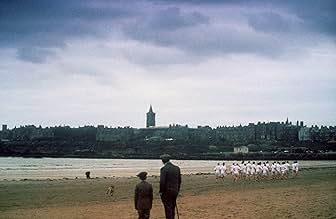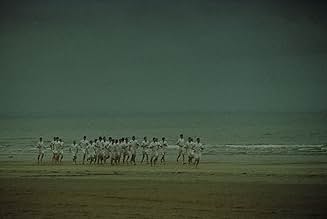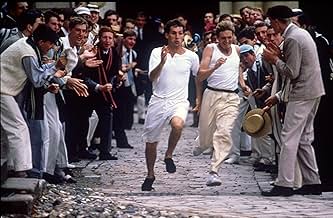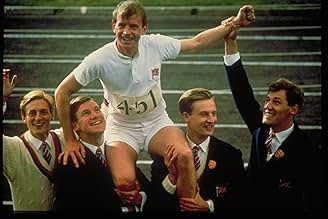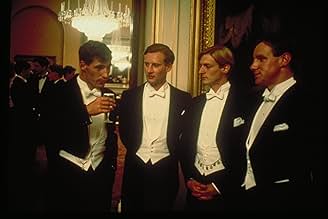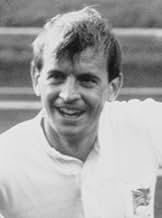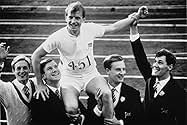La storia della rivalità fra due atleti inglesi che si preparano a partecipare alle olimpiadi del 1924. Entrambi sono spronati da motivi personali e sociali ben diversi tra loro.La storia della rivalità fra due atleti inglesi che si preparano a partecipare alle olimpiadi del 1924. Entrambi sono spronati da motivi personali e sociali ben diversi tra loro.La storia della rivalità fra due atleti inglesi che si preparano a partecipare alle olimpiadi del 1924. Entrambi sono spronati da motivi personali e sociali ben diversi tra loro.
- Regia
- Sceneggiatura
- Star
- Vincitore di 4 Oscar
- 18 vittorie e 19 candidature totali
John Gielgud
- Master of Trinity
- (as Sir John Gielgud)
Recensioni in evidenza
'tis been said that this movie is loved or hated, no middle ground.
I believe I know why.
It touches the most fundamental instincts and feelings in all of us.
The question it compels us to ask is, "Do I have a piece of greatness to offer to the world"?
Those of us who would answer yes, whether we believe is achievable or not, would love this movie, because it epitomizes the potential of our dreams, not just in running, but in any walk of life.
Those of us who would answer no, would hate this movie, because it highlights our acceptance of mediocrity, and of surrendered dreams.
Also, this movie touches those who have succeeded also.
It shows that there are two ways to succeed, the one not shown in the movie, and the one shown.
The one not shown is the one that motivates most truly successful people today. win at any cost, in sports, business, etc. and the consequences be damned.
The way to succeed shown in Chariots of Fire is probably naive by today's standards, but nonetheless noble and uplifting.
It tells us that success achieved through dedication, commitment, honesty and sacrifice is the noblest achievement a person can attain, and provides examples for others to emulate.
Liddell and Abrahams are not examples for runners, they are examples for people, true heroes of the spirit, not sport.
An unforgettable phrase, a torch to some and a knife to others,
" So where does the power to succeed come from?... It comes from within"
Those of us who have it, love it, those of us who do not have it, hate it.
If I live to be 100, I will still have my dreams stirred back to life by the message in this film
I believe I know why.
It touches the most fundamental instincts and feelings in all of us.
The question it compels us to ask is, "Do I have a piece of greatness to offer to the world"?
Those of us who would answer yes, whether we believe is achievable or not, would love this movie, because it epitomizes the potential of our dreams, not just in running, but in any walk of life.
Those of us who would answer no, would hate this movie, because it highlights our acceptance of mediocrity, and of surrendered dreams.
Also, this movie touches those who have succeeded also.
It shows that there are two ways to succeed, the one not shown in the movie, and the one shown.
The one not shown is the one that motivates most truly successful people today. win at any cost, in sports, business, etc. and the consequences be damned.
The way to succeed shown in Chariots of Fire is probably naive by today's standards, but nonetheless noble and uplifting.
It tells us that success achieved through dedication, commitment, honesty and sacrifice is the noblest achievement a person can attain, and provides examples for others to emulate.
Liddell and Abrahams are not examples for runners, they are examples for people, true heroes of the spirit, not sport.
An unforgettable phrase, a torch to some and a knife to others,
" So where does the power to succeed come from?... It comes from within"
Those of us who have it, love it, those of us who do not have it, hate it.
If I live to be 100, I will still have my dreams stirred back to life by the message in this film
This is the story of two men who run to prove something to the world . They will sacrifice anything to achieve their goals , except their honor . Two young men fighting for their objectives , one a determined Jew Harold Abrahams (Ben Cross) and the other a devout Christian (Ian Charleson) . In a warmup 100 meter race, Scottish Eric defeats Harold, who hires a pro coacher (Ian Holm) to prepare him . After that , both compete in the 1924 Olympics where their courage and determination to be tested . Eric Liddell , whose qualifying heat is scheduled for a Sunday, denies to run despite pressure from the Olympic committee formed by high authorities (Nigel Davenport , Patrick Magee , David Yelland as Prince of Wales) . Eric and Harold win their respective races and go on to achieve fame as missionary and businessman/athletic advocate, respectively . In fact , during the Japanese occupation of China, Eric as a missionary was taken into the Japanese Weihsien internment Camp, where he was to die from a brain tumour just before the camp was liberated.
This is is a sensitive as well as riveting story, being told in flashback , dealing with two young British sprinters , competing for fame in the 1924 Olympics , both of them compellingly performed by Ben Cross and the early deceased Ian Charleson . About six years after the film's release, Trinity College reenacted the quad dash with British Olympic athletes Steve Ovett and Sebastian Coe taking part.
This marvelous film has an all-star-cast such as Ben Cross ,Ian Charleson , Nigel Havers , Ian Holm , Cheryl Campbell and Alice Krige . Great secondary cast formed by prestigious British players and with a number of well known USA and UK performers for the tiny cameo roles such as John Gielgud ,Nigel Davenport , Lindsay Anderson , Patrick Magee , Peter Egan , Richard Griffiths and uncredited Kenneth Branagh as Cambridge student , Stephen Fry and first cinema film of Nicholas Farrell . Brad Davis and Dennis Christopher appeared as a favor to producer David Puttnam, waiving their fees, in order to attract finance from backers who wanted "marquee names" . Besides the lead actors, most of the white-clad runners training on West Sands in St. Andrews during the title sequence are St. Andrews golf caddies .
Colorful and evocative cinematography by David Watkin filmed on location in Edinburgh, Scotland, Liverpool , Cambridge University , Eton College, Eton, Berkshire, England . When the athletes are running off the beach , in reality it results to be West Sands at St Andrews in Scotland , they run towards a large red building clearly marked as a hotel ; this is in fact Hamilton hall of residence, a student accommodation hall belonging to the University .
Lavishly and luxuriously produced by great producer David Puttnam , he was looking for a story in the mold of A man for eternity (1966), regarding someone who follows their conscience ; he felt sports provided clear situations in this sense, and happened upon the story by accident while thumbing through an Olympic reference book in a rented house in Los Angeles , then the screenwriter Colin Welland took out advertisements in London newspapers seeking memories of the 1924 Olympics.
Film debut by filmmaker Hugh Hudson , he originally wanted Vangelis' 1977 tune "L'Enfant", from his 1979 'Opera Sauvage' album, to be the title theme of the film, and the beach running sequence was actually filmed with "L'Enfant" playing in the background for the runners to listen and pace to. Vangelis, however, finally convinced Hudson he could create a new and better piece for the film's main theme - and when he played the new and now-familiar "Chariots of Fire" theme for Hudson, it was agreed the new tune was unquestionably better. But the "L'Enfant" tune still made it into the film : When the athletes reach Paris and enter the stadium, a brass band marches through the field, and first plays a modified, acoustic performance of "L'Enfant" . Vangelis's electronic "L'Enfant" track eventually was used prominently in the film The years of living dangerously (1982). The picture deservedly won Academy Awards for Colin Welland's screenplay , Vangelis' magnificent soundtrack , Mila Canonero's costumes and Best picture .
This is is a sensitive as well as riveting story, being told in flashback , dealing with two young British sprinters , competing for fame in the 1924 Olympics , both of them compellingly performed by Ben Cross and the early deceased Ian Charleson . About six years after the film's release, Trinity College reenacted the quad dash with British Olympic athletes Steve Ovett and Sebastian Coe taking part.
This marvelous film has an all-star-cast such as Ben Cross ,Ian Charleson , Nigel Havers , Ian Holm , Cheryl Campbell and Alice Krige . Great secondary cast formed by prestigious British players and with a number of well known USA and UK performers for the tiny cameo roles such as John Gielgud ,Nigel Davenport , Lindsay Anderson , Patrick Magee , Peter Egan , Richard Griffiths and uncredited Kenneth Branagh as Cambridge student , Stephen Fry and first cinema film of Nicholas Farrell . Brad Davis and Dennis Christopher appeared as a favor to producer David Puttnam, waiving their fees, in order to attract finance from backers who wanted "marquee names" . Besides the lead actors, most of the white-clad runners training on West Sands in St. Andrews during the title sequence are St. Andrews golf caddies .
Colorful and evocative cinematography by David Watkin filmed on location in Edinburgh, Scotland, Liverpool , Cambridge University , Eton College, Eton, Berkshire, England . When the athletes are running off the beach , in reality it results to be West Sands at St Andrews in Scotland , they run towards a large red building clearly marked as a hotel ; this is in fact Hamilton hall of residence, a student accommodation hall belonging to the University .
Lavishly and luxuriously produced by great producer David Puttnam , he was looking for a story in the mold of A man for eternity (1966), regarding someone who follows their conscience ; he felt sports provided clear situations in this sense, and happened upon the story by accident while thumbing through an Olympic reference book in a rented house in Los Angeles , then the screenwriter Colin Welland took out advertisements in London newspapers seeking memories of the 1924 Olympics.
Film debut by filmmaker Hugh Hudson , he originally wanted Vangelis' 1977 tune "L'Enfant", from his 1979 'Opera Sauvage' album, to be the title theme of the film, and the beach running sequence was actually filmed with "L'Enfant" playing in the background for the runners to listen and pace to. Vangelis, however, finally convinced Hudson he could create a new and better piece for the film's main theme - and when he played the new and now-familiar "Chariots of Fire" theme for Hudson, it was agreed the new tune was unquestionably better. But the "L'Enfant" tune still made it into the film : When the athletes reach Paris and enter the stadium, a brass band marches through the field, and first plays a modified, acoustic performance of "L'Enfant" . Vangelis's electronic "L'Enfant" track eventually was used prominently in the film The years of living dangerously (1982). The picture deservedly won Academy Awards for Colin Welland's screenplay , Vangelis' magnificent soundtrack , Mila Canonero's costumes and Best picture .
The strength of this movie is the study in character contrast and development, with the added attractions of a historical setting and the soaring, ethereal musical score of Evangelos Papathanassiou.
The film is anchored in the character study of the introspective, brooding, and complex persona of Harold Abrahams, wonderfully portrayed by Ben Cross. Here is a man with all of the outward trappings of success: academic achievement, unexcelled athletic ability, wildly popular with his peers, yet tortured by an inbred inferiority complex and driven to lash out at the world in response. In the end, he conquers his inner demons through hard work, sacrifice, understanding of his fellow man, and the love of a good woman, to whom he opens his heart. I found myself thinking that Harold Abrahams is the kind of man I would want as my best friend, yet at the same time would find hard to become close with and relate to.
Ian Charleston's character (Eric Liddell) is a bit more one-dimensional. He is the archetypical Good Man, faithful to his family, his country, his friends, and his God. And in the end he triumphs through sheer force of will and by tapping that reservoir of inner strength that sustains him. As the crusty coach Sam Mussambini says, "He's a gut runner. Digs deep...".
It's a bit of a pity that the movie, long though it is, could not have delved more deeply into the other characters' background. Lord Andrew Lindsey is particularly appealing as Harold's and Eric's faithful friend who gives up his spot in his specialty race (the 400 m) to allow Eric a chance at the gold. Sybil Gordon is wonderful as Harold's love interest who tries to draw him out of his lonely world of bitterness and resentment and self-hatred ("You ran like a God. I was proud of you...", even after Harold loses a race for the first time in his life to a more determined Eric). Even some of the American competitors, who are only peripherally portrayed in the concluding segments, lend some color. Jackson Scholtz' reaching out to Eric Liddell gives one the sense that he knows the greatness of spirit that quietly resides in this unassuming Scotsman.
Its a wonderful story wonderfully told, and when its over you find yourself longing for it to continue, to see how these characters we've come to know over the previous two hours will turn out in the rest of their lives. Alas, the story of their lives is noted only in subtitles as the film closes.
The film is anchored in the character study of the introspective, brooding, and complex persona of Harold Abrahams, wonderfully portrayed by Ben Cross. Here is a man with all of the outward trappings of success: academic achievement, unexcelled athletic ability, wildly popular with his peers, yet tortured by an inbred inferiority complex and driven to lash out at the world in response. In the end, he conquers his inner demons through hard work, sacrifice, understanding of his fellow man, and the love of a good woman, to whom he opens his heart. I found myself thinking that Harold Abrahams is the kind of man I would want as my best friend, yet at the same time would find hard to become close with and relate to.
Ian Charleston's character (Eric Liddell) is a bit more one-dimensional. He is the archetypical Good Man, faithful to his family, his country, his friends, and his God. And in the end he triumphs through sheer force of will and by tapping that reservoir of inner strength that sustains him. As the crusty coach Sam Mussambini says, "He's a gut runner. Digs deep...".
It's a bit of a pity that the movie, long though it is, could not have delved more deeply into the other characters' background. Lord Andrew Lindsey is particularly appealing as Harold's and Eric's faithful friend who gives up his spot in his specialty race (the 400 m) to allow Eric a chance at the gold. Sybil Gordon is wonderful as Harold's love interest who tries to draw him out of his lonely world of bitterness and resentment and self-hatred ("You ran like a God. I was proud of you...", even after Harold loses a race for the first time in his life to a more determined Eric). Even some of the American competitors, who are only peripherally portrayed in the concluding segments, lend some color. Jackson Scholtz' reaching out to Eric Liddell gives one the sense that he knows the greatness of spirit that quietly resides in this unassuming Scotsman.
Its a wonderful story wonderfully told, and when its over you find yourself longing for it to continue, to see how these characters we've come to know over the previous two hours will turn out in the rest of their lives. Alas, the story of their lives is noted only in subtitles as the film closes.
I was a student at Edinburgh University in 1981 and was actually lodging with one branch of Eric Liddell's family.
My friends and I all went to see this movie repeatedly -- and I mean five, six, or seven paid entrances. Why?
Personally, I don't think it had anything to do with the plot, character development, the music, or moral virtue. It was simply that the film was so utterly beautiful.
The men were beautiful in a clean, non-glamorous way that we had never seen before. Not in British films, and certainly not in Hollywood movies.
The social and educational expectations shared by all were beautiful. I know it is fashionable to decry the British class system, and in principle I agree with all the criticisms. But it also seems that erasing class-by-birth leaves little else but crass meritocracy and the sheer vulgarity of the uneducated masses. Abraham's fellow students at Cambridge and Liddell's at Edinburgh participated in a social and educational system not driven by concerns about jobs, and not pathetically challenged by students who saw themselves as consumers and professors as entertainers.
Britain was beautiful. Of course some parts still are, but Nazi bombs, post-war architecture, and modern cars have destroyed much. This was a Britain where people at the time might have decried "Victorian" architecture, but we in 1981 were just coming to realize how great it was. And this was a Britain where, for good or ill, middle class people kept their houses tasteful, and working-class door-steps were white-stoned each week.
In all this movie was a connection to the beautiful aspects of the British past. That past might never have existed in reality, but in 1981 we could just about touch it, above all in Edinburgh, spared by German bombs and still one of the most beautiful cities in the world.
My friends and I all went to see this movie repeatedly -- and I mean five, six, or seven paid entrances. Why?
Personally, I don't think it had anything to do with the plot, character development, the music, or moral virtue. It was simply that the film was so utterly beautiful.
The men were beautiful in a clean, non-glamorous way that we had never seen before. Not in British films, and certainly not in Hollywood movies.
The social and educational expectations shared by all were beautiful. I know it is fashionable to decry the British class system, and in principle I agree with all the criticisms. But it also seems that erasing class-by-birth leaves little else but crass meritocracy and the sheer vulgarity of the uneducated masses. Abraham's fellow students at Cambridge and Liddell's at Edinburgh participated in a social and educational system not driven by concerns about jobs, and not pathetically challenged by students who saw themselves as consumers and professors as entertainers.
Britain was beautiful. Of course some parts still are, but Nazi bombs, post-war architecture, and modern cars have destroyed much. This was a Britain where people at the time might have decried "Victorian" architecture, but we in 1981 were just coming to realize how great it was. And this was a Britain where, for good or ill, middle class people kept their houses tasteful, and working-class door-steps were white-stoned each week.
In all this movie was a connection to the beautiful aspects of the British past. That past might never have existed in reality, but in 1981 we could just about touch it, above all in Edinburgh, spared by German bombs and still one of the most beautiful cities in the world.
"Chariots of Fire" is a fine motion picture that won the Best Picture Oscar in 1981, even though it was the longest of long-shots. The film deals with two young Englishmen (Ben Cross and Ian Charleson) who have hopes of glory at the 1924 Olympics. We see that their struggles almost cost them the opportunity to achieve the greatness that they both desire. When they are both ultimately successful, Charleson feels that his win is due to God's glory and accepts the medal with the greatest of pride and admiration. However, after Cross wins the gold he feels somewhat disappointed and realizes that what he thought he wanted was not what he really wanted at all. The insight into this motion picture is amazing. Both athletes convey very common feelings that most people experience if they are serious enough in what they are doing, whether it be sports or something else. The main focus of "Chariots of Fire" is that the journey to get to the destination is more important and uplifting than the destination itself. Many question the fact that this film won the Best Picture Oscar over "Reds" and "Raiders of the Lost Ark". However, this is one time I cannot say anything negative about the Academy's decision. The fact that this film won in 1981 is testimony to the fact that the Academy is one of the greatest organizations in the world. Kudos to all involved here. 5 stars out of 5.
Oscars Best Picture Winners, Ranked
Oscars Best Picture Winners, Ranked
See the complete list of Oscars Best Picture winners, ranked by IMDb ratings.
Lo sapevi?
- QuizWhen Colin Welland completed his first draft, the only title he could come up with was "Runners". Then, one Sunday evening he turned on BBC's religious music series Songs of Praise (1961), featuring the hymn "Jerusalem," with lyrics from a poem by William Blake. The chorus included the words "Bring me my chariot of fire". The writer leaped to his feet and shouted to his wife, "I've got it, Pat! 'Chariots of Fire'!" (The "Jerusalem" hymn is featured at the beginning and end of the movie.)
- BlooperWhen signing an autograph for a young fan, Eric Liddell does not unscrew or remove any cap from the pen he uses. As all fountain pens have caps, he seems to be using a modern day ballpoint pen which was not invented until 1938.
- Citazioni
Eric Liddell: I believe God made me for a purpose - but He also made me fast. And when I run, I feel His pleasure.
- Versioni alternativeThere is at least one slightly different version of the movie, issued in Europe on homevideo. The beginning is different - shorter - and introduces Harold Abrahams while playing cricket with his colleagues. The scene in the train station, where Monty meets Harold is absent, as well as the loading of the baggage in the taxi they share. We simply see Monty writing a letter to his parents, mentioning that "Harold is as intense as ever" (cut to the cricket scene, maybe 30 seconds long), and then continues with "I remember our first day... we shared a taxi together" (cut to the two students unloading their stuff from the car). This alternate version also have slightly different end credits, and does not mention Harold marrying Sybil. The differences are minor (the U.S. version provides a more shocking memento of WWI, when it shows crippled baggage handlers in the station); one of the reasons the cricket scene was dropped in favour of the station one was due to the distributor's worry that the American market would not understand it.
- ConnessioniFeatured in Vangelis: Chariots of Fire (1981)
- Colonne sonoreHe is an Englishman
(1878) (uncredited)
from "H.M.S. Pinafore"
Music by Arthur Sullivan
Lyrics by W.S. Gilbert
I più visti
Accedi per valutare e creare un elenco di titoli salvati per ottenere consigli personalizzati
- How long is Chariots of Fire?Powered by Alexa
Dettagli
- Data di uscita
- Paese di origine
- Lingue
- Celebre anche come
- Carros de fuego
- Luoghi delle riprese
- Aziende produttrici
- Vedi altri crediti dell’azienda su IMDbPro
Botteghino
- Budget
- 5.500.000 USD (previsto)
- Lordo Stati Uniti e Canada
- 58.972.904 USD
- Fine settimana di apertura Stati Uniti e Canada
- 68.907 USD
- 27 set 1981
- Lordo in tutto il mondo
- 59.317.376 USD
- Tempo di esecuzione2 ore 5 minuti
- Colore
- Mix di suoni
- Proporzioni
- 1.85 : 1
Contribuisci a questa pagina
Suggerisci una modifica o aggiungi i contenuti mancanti








